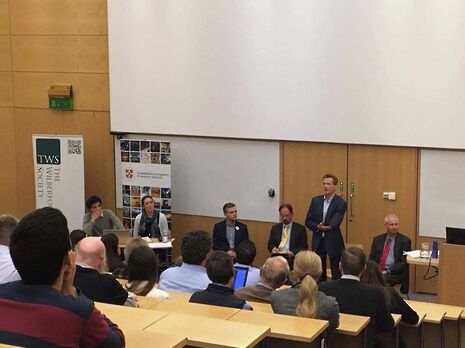
Parliamentary candidates in Brexit hustings
The candidates from the four major parties discussed the impact of Brexit on immigration and the economy

On Tuesday, The Wilberforce Society and Cambridge European Society hosted Cambridge’s parliamentary candidates in a Brexit-themed hustings.
Students and members of the local community questioned the four candidates, Daniel Zeichner (Labour), Julian Huppert (Liberal Democrats), John Hayward (Conservatives) and Stuart Tuckwood (Greens), in a discussion that touched upon a range of Brexit-related issues, including immigration and the economy.
The discussion was framed by the findings of the Cambridge Brexit Report, compiled by The Wilberforce Society and Cambridge European Society, in collaboration with Cambridge for Europe, Cambridge Stays, and Polygeia, a student-led think tank.
The Cambridge Brexit Report is collection of original research, carried out both among the student body and the local community. The executive summary notes makes two overarching recommendations; firstly, that all possible efforts must be taken to dispel the uncertainty caused by Brexit, and secondly, that the government “launch public consultations in cities and towns all over the UK, and rely on the resulting reports to inform its Brexit negotiations and policies”.
After opening statements from each candidate, the audience-led discussion explored Brexit, its effect on universities and students, and the economy. All four candidates stressed the importance of a Brexit that works for Cambridge, with Julian Huppert vowing to ensure this is achieved by fighting against Brexit until the UK officially leaves the European Union.
Key recommendations from the Report formed the centre of the debate, including removing international students from migration quotas, which Tuckwood, Huppert and Zeichner all wholeheartedly backed. Hayward, meanwhile, whilst emphasising his own history as an international student, argued that the issue is “not that black and white”.
The debate also broached national political issues. Asked if their parties should establish a progressive alliance at the upcoming general election, Tuckwood, Zeichner and Huppert agreed that they were open to “working together”. However, in the last month both Tim Farron and Jeremy Corbyn have dismissed the idea of an election pact between their respective parties and the Greens, an obstacle cited by both Huppert and Hayward. Zeichner argued that only Labour could provide effective opposition to the Conservatives.
Speaking to Varsity, Zeichner emphasised his satisfaction with the final Report, and urged young people to be vocal about their opposition to the referendum result. He added that only Labour was in a position to prevent “generational betrayal” as the Brexit process is initiated.
The Wilberforce Society’s Executive Chair, Hattie Stacey, emphasised to Varsity the importance of the report as a collaborative effort, drawing both cross-party backing and support from the local community. However, she expressed doubt over whether the report, which was presented in the EU parliament last month, would be successful in effecting any practical change, and stressed that converting policy into action is “very very hard”
 News / Cambridge postgrad re-elected as City councillor4 May 2024
News / Cambridge postgrad re-elected as City councillor4 May 2024 News / Gender attainment gap to be excluded from Cambridge access report3 May 2024
News / Gender attainment gap to be excluded from Cambridge access report3 May 2024 News / Cambridge students set up encampment calling for Israel divestment6 May 2024
News / Cambridge students set up encampment calling for Israel divestment6 May 2024 News / Some supervisors’ effective pay rate £3 below living wage, new report finds5 May 2024
News / Some supervisors’ effective pay rate £3 below living wage, new report finds5 May 2024 News / Academics call for Cambridge to drop investigation into ‘race realist’ fellow2 May 2024
News / Academics call for Cambridge to drop investigation into ‘race realist’ fellow2 May 2024





